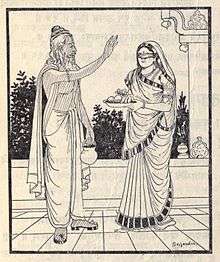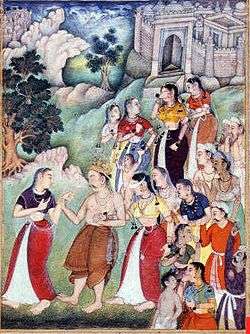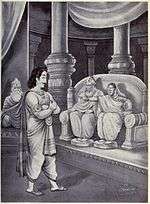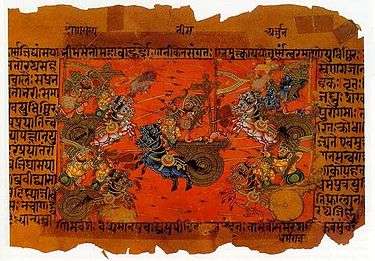Gandhari (character)
| Gandhari | |
|---|---|
| Mahabharata character | |
 Gandhari receiving boon from Vyasa | |
| Information | |
| Family | Subala (father) Sudarma (mother) Shakuni (elder brother) Arsh (shakuni's wife) Uluka (shakuni's son) |
| Spouse(s) | Dhritarashtra |
| Children | Duryodhana, Dushasana, Vikarna, 97 other sons and Duhsala (daughter) |
Gandhari (Sanskrit: गांधारी, lit. A girl from Gandhara) is a prominent character in the Hindu epic the Mahabharata. She was a princess of Gandhara and the wife of Dhritrashtra, the blind king of Hastinapura, and the mother of a hundred sons, the Kauravas.
As a pativratha (devoted wife) without parallel, Gandhari is regarded as an epitome of virtue, and is among the most respected moral forces in the epic. She was not only married to a blind man, but at the time of her wedding, she resolved to spend the remainder of her life as a blind woman herself, in order to share the debility and pain of her husband. For the rest of her life, she kept a cloth tied to her eyes and thus deprived herself of the power of sight. At certain critical junctures, she gave advice to her husband which was impeccable from a moral standpoint; she never wavered in her adherence to dharma (righteousness), even to a very bitter end. She was fated to witness the death of all her hundred sons within the space of 18 days, during the Great War between them and their cousins; she also curses the lord Krishna when she was full of sorrow on the death of her 100 children that his vansh (Clan) would also be destroyed in the same manner as that of her. She then retired with her husband to spend her last days in a forest hermitage.[1]
Early life
As a maiden, Gandhari was noted for her piety and virtuous nature. Gandhari is regarded as an incarnation of Mati, the goddess of wisdom. She was born on earth as the daughter of Subala, king of Gandhara and was named 'Gandhari' by her father in honour of his land. She is also referred to in various places in the epic as Gandhara-raja-duhita (daughter of the Gandhara king), Saubaleyi, Saubali, Subalaja, Subala-putri and Subalatmaja (all meaning 'daughter of Subala'). She was sister of Shakuni.
Marriage
Gandhari's marriage was arranged to Dhritarashtra, the eldest prince of the Kuru kingdom, a region in Delhi and Haryana region. The Mahabharata depicted her as a beautiful and virtuous woman and a very dedicated wife. Gandhari was married with Dhritarashtra, king of Hastinapur. Their marriage was arranged by Bhishma. When she found out that her would-be husband was born blind, she decided to blindfold herself in order to be like her husband. What was going through the young girl's mind when she found out that she was going to marry a blind man is not depicted in the epic. Popular narration said that the act of blindfolding herself was a sign of dedication and love. On the other hand, Irawati Karve and many modern scholars debated that the act of blindfolding was an act of protest against Bhishma, as he intimidated her father into giving away her hand in marriage to the blind prince of Hastinapur.[2]
Some folkfore and many mordern version of Mahabharata depict her marriage as a major reason for the story's central conflict. Her brother, Shakuni, was enraged that Hastinapur, already having humiliated Gandhar in a war of conquest where all of Shakuni's brothers were killed, would offer for his prized sister a blind man. Shakuni swore to destroy the Kuru dynasty and played an instrumental role in fueling the flames of conflict between the cousins.
Pregnancy and birth of her children
Veda Vyasa is impressed with Gandhari's devotion to her husband and gives her a boon to have a hundred sons. She gets pregnant but carries the child for an unusually long period. Later she hears that Kunti (queen of king Pandu, younger brother of Dhritharashtra) has given birth to Pandavas, and in frustration she pounds on her stomach. A small grey mass comes out of her. Veda Vyasa divides this into 101 parts and keeps them in cool earthen pots to incubate. First Duryodhana comes out, followed by 99 brothers and one sister, Dushala.[3]
During the birth of her first son Duryodhana, many ill omens occur, worrying Vyasa, Bhishma and Vidura. They foresee that this child might cause the great destruction to their kingdom, and advise to kill him. But Dhritarashtra and Gandhari outrightly reject that idea, and in later life they both turn blind to his misdoings.
Later life and death

Some folk fore narrate that Gandhari made a single exception to her blindfolded state, when she removed her blindfold to see her eldest son Duryodhana. She poured all her power into her son's body in one glance, rendering Duryodhana's entire body, except his loins, as strong as iron. Krishna foiled Gandhari's plan by asking Duryodhana to cover up his privates before meeting his mother. On their decisive encounter on the eighteenth day of the Kurukshetra battle, Bhima smashed Duryodhana's thighs, a move both literally and figuratively below the belt. This story is not mentioned in the original version of the Mahabharata which was written by Veda Vyasa. As per Vyasa's Mahabharata, Duryodhana, while fighting against Bhima, displayed his superior mace skills, due to which Bhima could not defeat him and had to break rules to kill him.
All of Gandhari's sons were killed in the war against their cousins, the Pandavas, at Kurukshetra, specifically at the hands of Bhima. Upon hearing the news, it is said that through a small gap in the blindfold, her gaze fell on Yudhishthira's toe. His clean toe was charred black due to her wrath and power. When she heard the news of the death of all the sons of Pandavas(Upapandavas), she embraced the Pandavas and consoled them for their losses. Later her wrath turned to Krishna for allowing all this destruction to happen.[4] She cursed that he, his city and all his subjects would be destroyed. Krishna accept the curse but reminds her that she applauded her sons when they committed wicked deeds before the war and she is questioning justice in and after war, a justice she denied others before the war. Her curse took its course 36 years after the great war when Yadu dynasty perished after a fight broke out between yadavas at a festival. Lord Krishna ascended to his heavenly abode after living for 126 years. The golden city of Dwarka drowned exactly seven days after his disappreance.Gandhari along with her husband Dhritarashtra, brother-in-law Vidura and sister-in-law Kunti, left Hastinapur about 15 years after war for penance. She was said to have died in the Himalayas in a forest fire and attained moksha. [5]
Portrayal in the Mahabharata

The Mahabharata attributes high moral standards to Gandhari, although her sons are portrayed as villains. She repeatedly exhorted her sons to follow dharma and make peace with the Pandavas. Gandhari fostered a big-little sister relationship with Kunti. Famously, when Duryodhana would ask for her blessing of victory during the Kurukshetra war, Gandhari would only say "may victory find the side of righteousness". Gandhari's major flaw was her love for her sons, especially her first born, Duryodhana, which often blinded her to his flaws.
Legacy
In Hebbya village, Nanjangud, Mysore, India there is a temple called Gāndhārī temple dedicated to her.This temple honours her devotion and loyalty as she epitomized the goodness of a mother and a loving wife. The foundation stone of the temple was laid on June 19, 2008. It was expected to cost Rs 2.5 crore (INR 25 million). [6]
Rabindranath Tagore wrote a Bengali poetic play about her, named Gandharir Abedon (Bangla: গান্ধারীর আবেদন, Translation:Supplication of Gandhari). The play portray Gandhari, her husband Dhritarashtra and their son Duryodhana as central character.[7]
In media and television
- In B.R.Chopra's Mahabharat Gandhari was portrayed by Renuka Israni
- In 2013 Mahabharat TV Series Gandhari was portrayed by Riya Deepsi
- In Dharmakshetra (2014) Gandhari was portrayed by Maleeka R Ghai
- In Suryaputra Karna (2015 TV Series) Gandhari was portrayed by Smriti Sinha Vatsa
References
- ↑ Ganguli, Kisari Mohan. The Mahabharata of Krishna-Dwaipayana Vyasa Translated into English Prose by Kisari Mohan Ganguli. N.p.: n.p., n.d. Web.
- ↑ Irawati Karve, Yuganta: The End of an Epoch, Chapter:3
- ↑ "The Mahabharata, Book : Adi Parva:Sambhava Parva : Section:CXV". Sacred-texts.com.
- ↑ Stri Parva The Mahabharata, Translated by Kisari Mohan Ganguli, Published by P.C. Roy (1889)
- ↑ Pattanaik, Devdutt. "Tears of Gandhari". Devdutt.
- ↑ "Gandhari temple: a testimony to loyalty and womanhood". The Hindu. 20 June 2008.
- ↑ Sanchayita by Rabindranath Tagore
| Wikisource has original text related to this article: |

